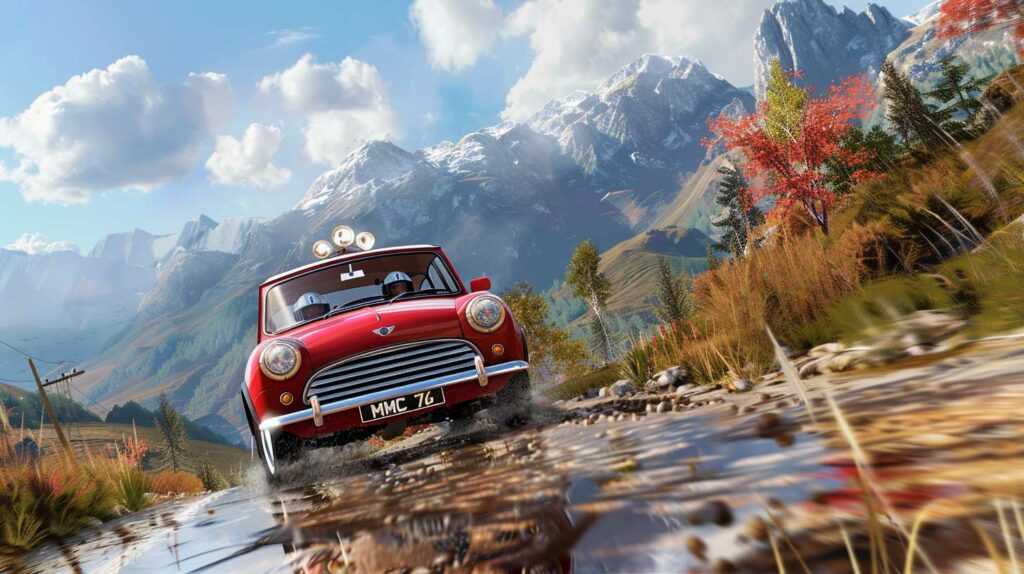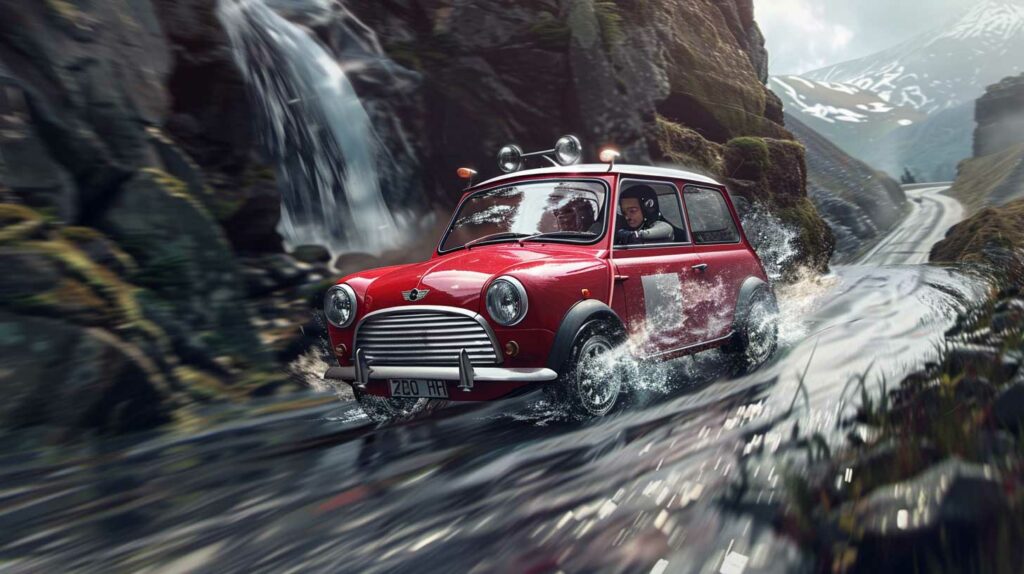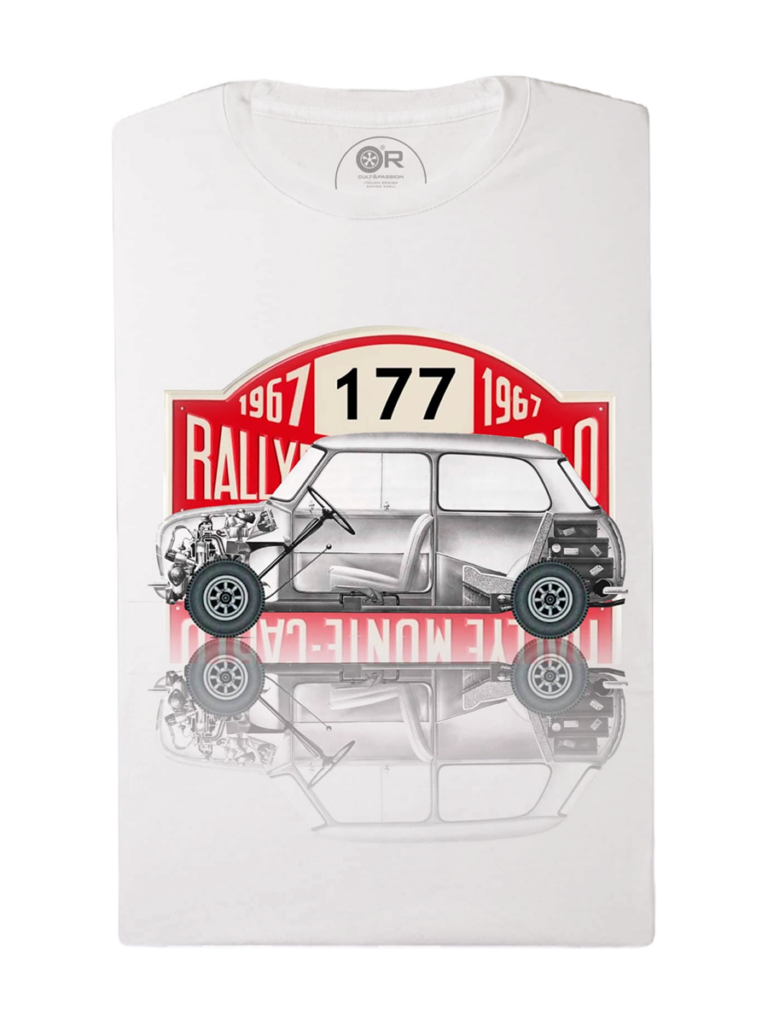Unveiling the Unlikely Hero
The story of the Mini Cooper S at the Monte Carlo Rally is a captivating saga of grit, passion, and victory. Conceived as a “final destination Monte Carlo” race by Prince Albert I of Monaco, the rally tested innovation in automobile performance and design, along with the mettle of the drivers. In its first inception, somewhat arbitrary and quirky judging took into account not only each car’s performance but also its condition on arrival at the final destination (and even the number of passengers and pieces of luggage being carried).
In 1959, the racing world was forever changed when John Cooper, a visionary car designer, discovered the Mini. His Formula One team was just about to win the world championship thanks to its revolutionary mid-engine concept, yet it took Cooper quite a while to persuade Alec Issigonis and the British Motor Corporation that a racing version of the small car had just as much merit. Cooper was thrilled by the Mini’s extremely agile handling, which was confirmed by initial test runs. He pressed on despite all doubts..

How it all started
He made sure the power was increased. And, in doing so, formed an unbeatable team. In September 1961, the first production versions appeared on the market: the Austin Seven Cooper and Morris Mini Cooper. The press and public were enthusiastic about the new models – but they waited to see if the little Mini could prevail over the significantly more powerful competition. The announcement that Mini intended to enter the prestigious rally was greeted with a level of disbelief. Mini was a car revered for its energetic and gleeful drive experience for urban householders. But a rally racer? It seemed unthinkable that such a compact city-focused vehicle could possibly cope with the rigours of a long and arduous rally such as the Monte Carlo Rally. Even after the visionary refinements incorporated by John Cooper to Alec Issigonis’ go-kart feeling car, the tuned engine was still up against cars three or four times more powerful. In those days of two-wheel-drive rally racers, huge distances and long mileages had to be covered. Undeterred, the newly created tartan red BMC Works Mini Cooper S, topped with its high visibility white roof, driven by Paddy Hopkirk and co-pilot Henry Liddon, was entered for the 1964 event.
David versus Goliath
Early rallies featured one of the most intense, stuff-of-legends stages of any race. A Bollène-Vésubie to Sospel section traversed the Col de Turini, not only a mountainous route – with multiple hairpin bends, often layered with compacted ice and fresh powder snow – but also a section run at night. It was here in the most hostile of stages that Hopkirk and Liddon were able to trounce the competition. In what has gone down in racing folklore as the “night of the long knives,” the Mini’s agile handling outmanoeuvred the competing teams. Seizing their advantage, Hopkirk and Liddon sprinted the last leg through Monte Carlo’s streets to confirm the historic victory was indeed theirs.
The win made headlines around the UK. On his return to the country, Paddy appeared on the popular variety show ‘Sunday Night at the Palladium’ to recount his experiences to Bruce Forsyth. He also received a congratulatory telegram from Prime Minister Alex Douglas-Horne, and The Beatles sent him a signed photo with their own congratulations. With the Mini brand already gaining traction due to its affordability, surprisingly-roomy interior, and ease-of-driving, the 1964 Monte Carlo Rally win helped to sign it off as a British icon; a must-have for anyone intending to evoke a ‘trendy’ and ‘fashionable’ image. Over five decades on, Paddy is still very much a revered figure for Mini fans of all ages – from those that remember the famous win to those who are just learning about it.

The Mini Cooper S’s Troubles and Successes
The Mini Cooper S’s participation in the Monte Carlo Rally was not without its share of challenges. In 1966, the ‘works’ Mini Cooper S was embroiled in a scandal in Monte Carlo and a most unsavoury protest drama in the Acropolis. The Mini Cooper S, it seemed, had almost come to the peak of its influence in rallying, and the opposition was clearly not at all happy about that.
However, despite the controversies, the ‘works’ Mini Cooper S eventually won eight major rallies, solidifying its place in motorsport history. The Mini Cooper S’s successes were a testament to its enduring legacy and the indomitable spirit of the individuals who made it a legend.
The Drive of the Century
In what has often been described as the Drive of the Century, no one could catch Timo Makinen’s 1275S on its way to winning the 1965 Monte Carlo Rally. Strangely, for an event beset with blizzards, there was no snow on the ground at this point. The victory was a testament to the Mini Cooper S’s exceptional performance and the remarkable talents of its drivers. The Mini Cooper S’s triumph at the rally was not just about speed and agility but a celebration of innovation, passion, and the relentless pursuit of excellence.

Celebrate the Mini Cooper S Monte Carlo Rally wins with an exclusive Original Race Australia T-shirt
The Mini Cooper S’s Versatility
The Mini Cooper S’s triumphs were not limited to the Monte Carlo Rally. It won six rallies outright, with five of the wins going to Rauno Aaltonen. As a result, Rauno was crowned European Rally Champion, solidifying the Mini Cooper S as Europe’s most versatile and practical rally car. The Mini Cooper S’s victories were a testament to its enduring legacy and the indomitable spirit of the individuals who made it a legend.
In conclusion, the triumph of the Mini Cooper S at the Monte Carlo Rally was not just a singular event; it was a testament to the enduring legacy of the vehicle and the individuals who made it a legend. The victory at the rally was a celebration of the unyielding spirit of the underdog, a reminder that greatness knows no bounds and that with passion and perseverance, anything is possible. The Mini Cooper S’s enduring legacy inspires generations of motorsport enthusiasts, reminding us that the impossible can be achieved with determination and resilience.
FAQs: Unveiling the Triumph
How did the Mini Cooper S perform at the Monte Carlo Rally?
The Mini Cooper S’s performance at the Monte Carlo Rally was nothing short of extraordinary. Despite being up against cars three or four times more powerful, the Mini Cooper S, driven by Paddy Hopkirk and co-pilot Henry Liddon, outmanoeuvred the competition and sprinted through Monte Carlo’s streets to confirm the historic victory was indeed theirs.
What challenges did the Mini Cooper S face in the Monte Carlo Rally?
The Mini Cooper S faced its share of challenges, including controversies and scandals in the 1966 Monte Carlo Rally. However, despite the controversies, the ‘works’ Mini Cooper S eventually won eight major rallies, solidifying its place in motorsport history.

